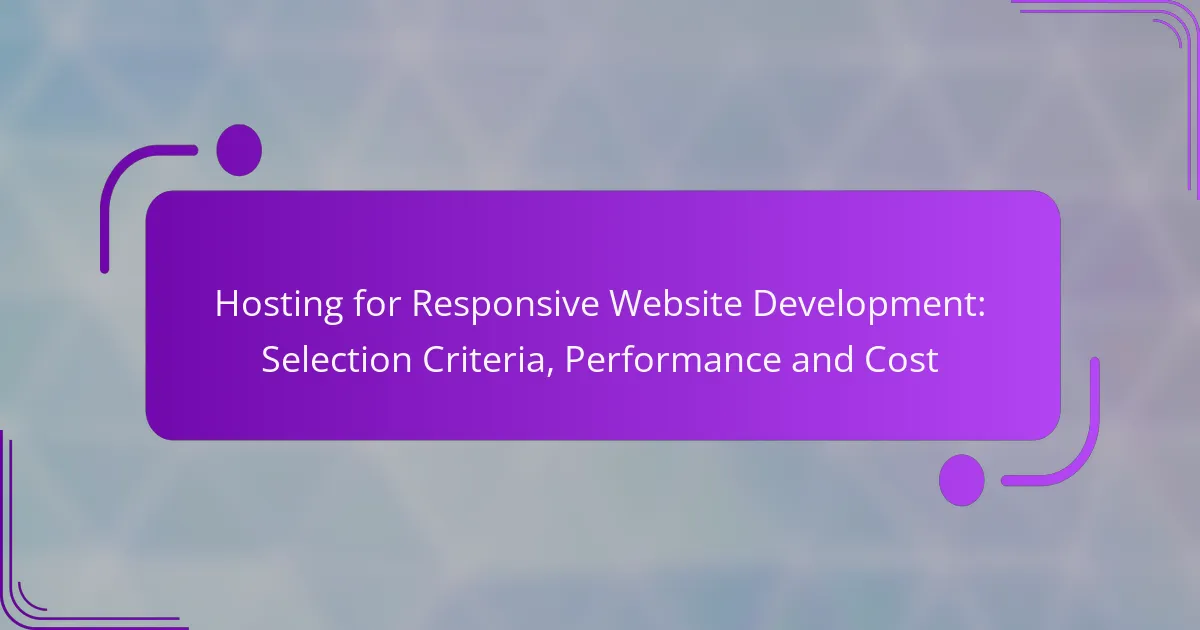Choosing the right hosting service is crucial for responsive website development, as it directly affects performance, scalability, and cost. Options such as shared hosting, VPS, cloud hosting, and dedicated servers each offer unique advantages, making it essential to evaluate them based on uptime, load speed, and technical support. By carefully considering these factors, you can ensure an optimal user experience and effective site functionality.
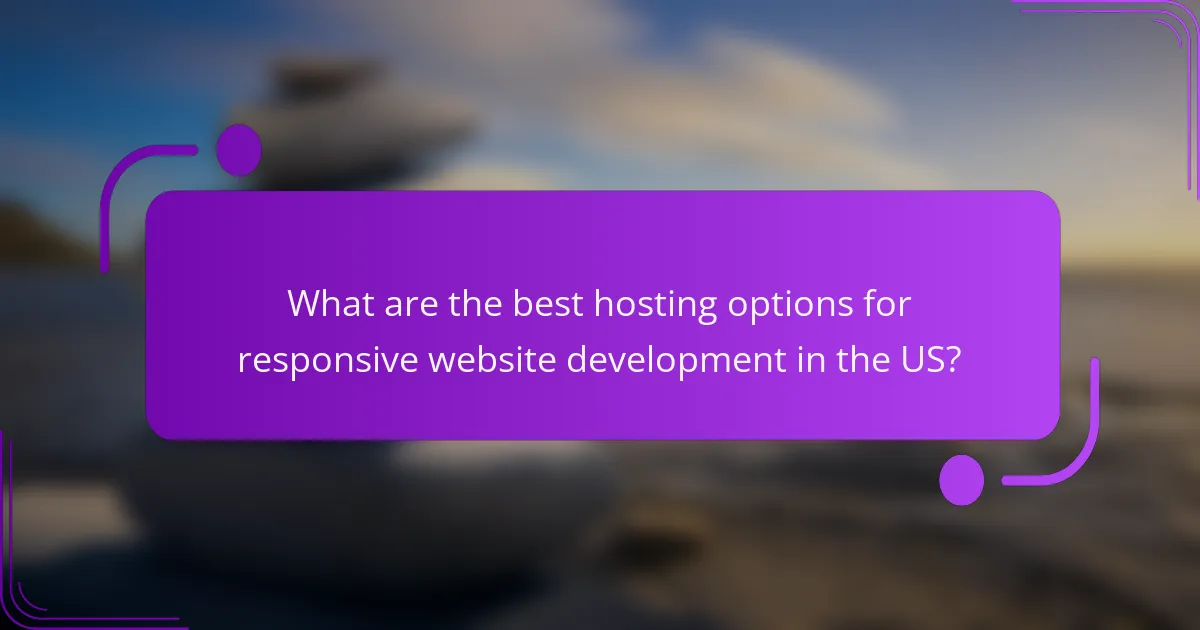
What are the best hosting options for responsive website development in the US?
The best hosting options for responsive website development in the US include shared hosting, VPS hosting, cloud hosting, dedicated servers, and managed WordPress hosting. Each option has its own strengths and weaknesses, making it essential to consider factors like performance, scalability, and cost when selecting the right service for your needs.
Shared hosting services
Shared hosting services are a cost-effective option for small websites and startups. Multiple websites share the same server resources, which keeps prices low, typically ranging from $3 to $10 per month.
However, this can lead to slower performance during peak traffic times. It’s ideal for sites with low to moderate traffic and minimal resource requirements.
VPS hosting providers
VPS (Virtual Private Server) hosting offers a middle ground between shared and dedicated hosting. It provides dedicated resources on a virtual server, allowing for better performance and customization, usually costing between $20 and $100 per month.
This option is suitable for growing websites that need more control and resources without the higher costs of dedicated servers. Users can install custom software and have more flexibility in server management.
Cloud hosting platforms
Cloud hosting platforms utilize multiple servers to host websites, ensuring high availability and scalability. Costs vary widely, often starting around $10 per month, depending on usage and resources.
This option is ideal for websites with fluctuating traffic, as it can handle sudden spikes without downtime. Users pay for what they use, making it a flexible choice for businesses of all sizes.
Dedicated server solutions
Dedicated server solutions provide an entire server exclusively for one website, offering maximum performance and security. Prices typically range from $80 to several hundred dollars per month, depending on server specifications.
This option is best for large websites or applications with high traffic demands, as it allows complete control over server settings and resources. However, it requires more technical expertise to manage effectively.
Managed WordPress hosting
Managed WordPress hosting is specifically optimized for WordPress sites, providing features like automatic updates, backups, and enhanced security. Pricing usually starts around $20 per month.
This option is ideal for users who want a hassle-free experience, as the hosting provider handles technical aspects. It’s particularly beneficial for businesses focused on content management and online presence without needing extensive technical knowledge.
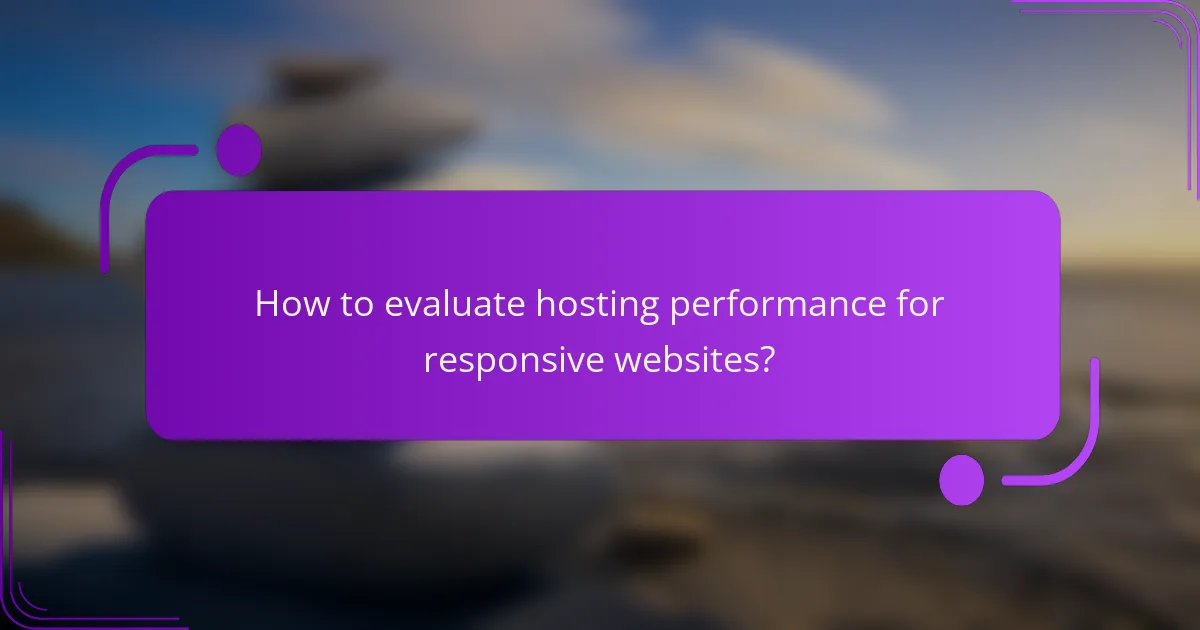
How to evaluate hosting performance for responsive websites?
To evaluate hosting performance for responsive websites, focus on uptime, load speed, and scalability. These factors directly impact user experience and site functionality, making them crucial for responsive design.
Uptime guarantees
Uptime guarantees indicate the percentage of time a hosting service is operational. Look for providers that offer at least 99.9% uptime, which translates to minimal downtime and ensures your site remains accessible to users.
Consider the implications of downtime on your business. Even a few minutes of unavailability can lead to lost revenue and damage to your brand. Check the provider’s history and customer reviews for reliability.
Load speed metrics
Load speed metrics measure how quickly your website content is delivered to users. Aim for a load time of under 3 seconds, as slower speeds can lead to higher bounce rates and lower user satisfaction.
Utilize tools like Google PageSpeed Insights or GTmetrix to analyze load speeds. These tools can provide insights into specific areas for improvement, such as image optimization or server response times.
Scalability options
Scalability options determine how easily you can upgrade your hosting plan as your website grows. Choose a provider that offers flexible plans, allowing you to adjust resources without significant downtime or migration hassles.
Consider your projected growth and traffic spikes. A good host should provide easy upgrades, whether through shared, VPS, or dedicated hosting solutions, ensuring your site can handle increased demand efficiently.
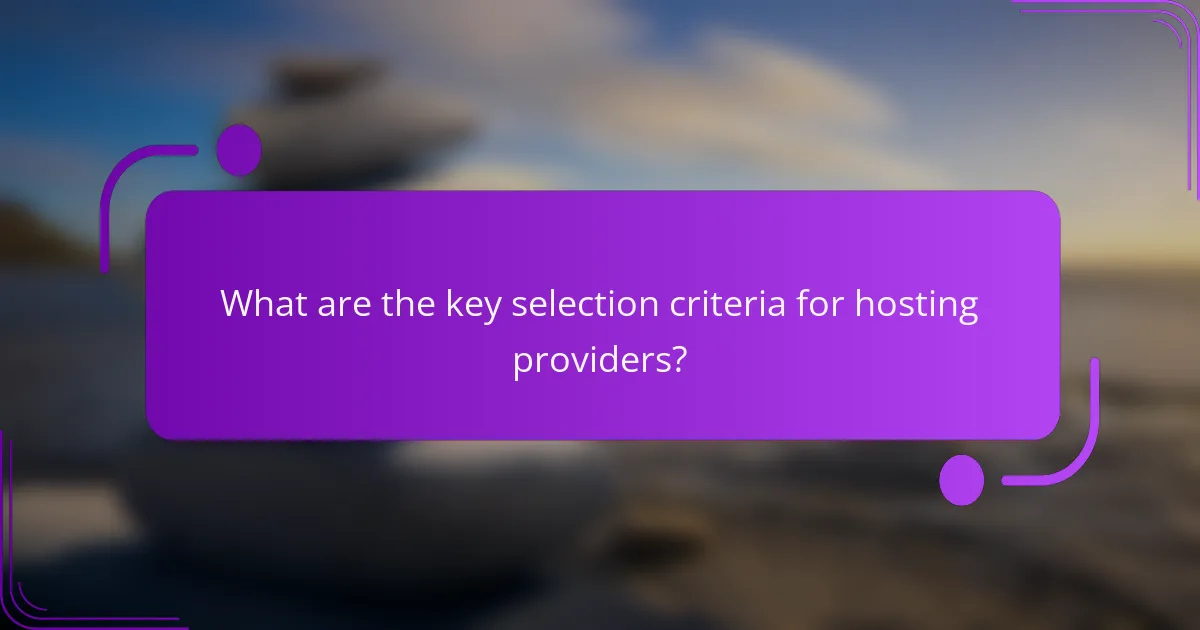
What are the key selection criteria for hosting providers?
When selecting a hosting provider for responsive website development, consider factors such as cost, technical support, and security features. These criteria will significantly impact your website’s performance and overall user experience.
Cost considerations
Cost is often a primary factor when choosing a hosting provider. Look for plans that fit within your budget while offering the necessary features. Typical hosting costs can range from a few dollars per month for shared hosting to hundreds for dedicated servers.
Evaluate what is included in the price, such as bandwidth, storage, and additional services like backups and SSL certificates. Avoid providers that have hidden fees, which can inflate your overall expenses.
Technical support availability
Reliable technical support is crucial for resolving issues quickly. Check if the hosting provider offers 24/7 support through multiple channels, such as live chat, phone, and email. Fast response times can minimize downtime and enhance your website’s reliability.
Read reviews to gauge the quality of support. A provider with a reputation for excellent customer service can save you time and frustration, especially during critical situations.
Security features
Security is essential for protecting your website and user data. Look for hosting providers that offer built-in security features, such as firewalls, DDoS protection, and regular backups. These features can help safeguard against common threats.
Additionally, ensure that the provider complies with relevant security standards, such as GDPR for European users. A strong security posture not only protects your site but also builds trust with your audience.
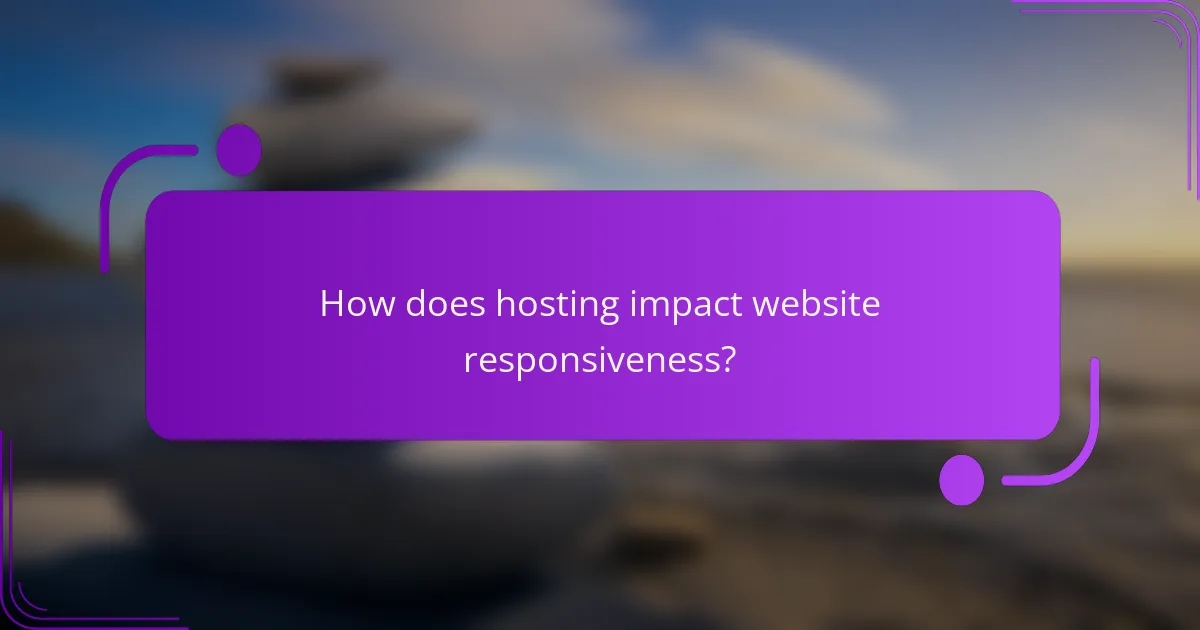
How does hosting impact website responsiveness?
Hosting plays a crucial role in website responsiveness by affecting loading times and overall user experience. A well-chosen hosting solution can significantly enhance site speed, while poor hosting can lead to delays that frustrate users and increase bounce rates.
Server response time
Server response time is the duration it takes for a server to respond to a user’s request. Ideally, this time should be in the low tens of milliseconds to ensure a smooth browsing experience. If response times exceed 200 milliseconds, users may start to notice delays, which can negatively impact their interaction with the site.
To improve server response time, consider using a hosting provider that offers optimized server configurations and resources. Shared hosting may be cheaper but often leads to slower response times due to resource competition. Opting for dedicated or VPS hosting can provide better performance for responsive websites.
Content delivery network integration
A Content Delivery Network (CDN) enhances website responsiveness by distributing content across multiple servers worldwide. This allows users to access data from a server geographically closer to them, reducing latency and improving load times. Integrating a CDN can lead to performance improvements of up to 50% in some cases.
When selecting a CDN, look for one that offers seamless integration with your hosting provider. Many popular hosting services include CDN options or partnerships, making setup straightforward. Additionally, ensure that the CDN supports dynamic content delivery if your site relies on real-time data, as this can further enhance responsiveness.
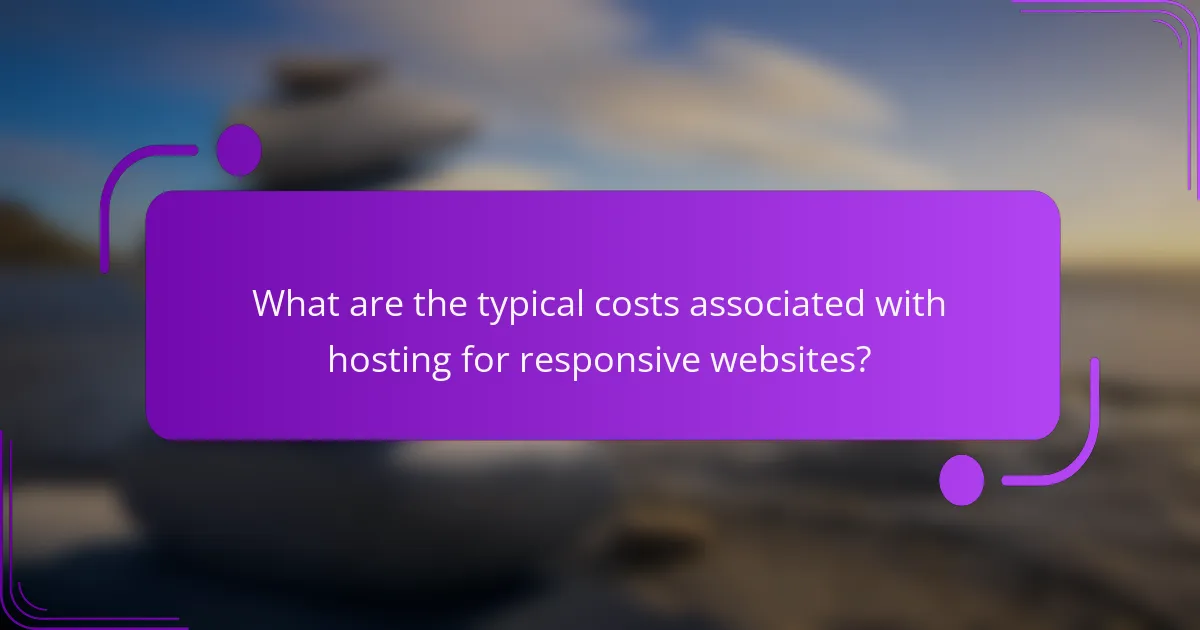
What are the typical costs associated with hosting for responsive websites?
The costs associated with hosting responsive websites can vary significantly based on factors like the hosting type, provider, and specific features required. Generally, businesses can expect to pay anywhere from a few dollars to several hundred dollars per month, depending on their needs and the level of service chosen.
Monthly pricing ranges
For shared hosting, which is often suitable for small to medium-sized responsive websites, prices typically range from $3 to $10 per month. This option is cost-effective but may have limitations in terms of performance and resources.
VPS (Virtual Private Server) hosting offers more resources and better performance, with monthly costs generally between $20 and $100. This is ideal for growing websites that need more control and reliability without the high costs of dedicated servers.
Dedicated hosting, which provides an entire server for a single website, usually starts around $100 per month and can exceed $500 for high-performance setups. This option is best for large businesses or websites with high traffic that require maximum uptime and speed.
